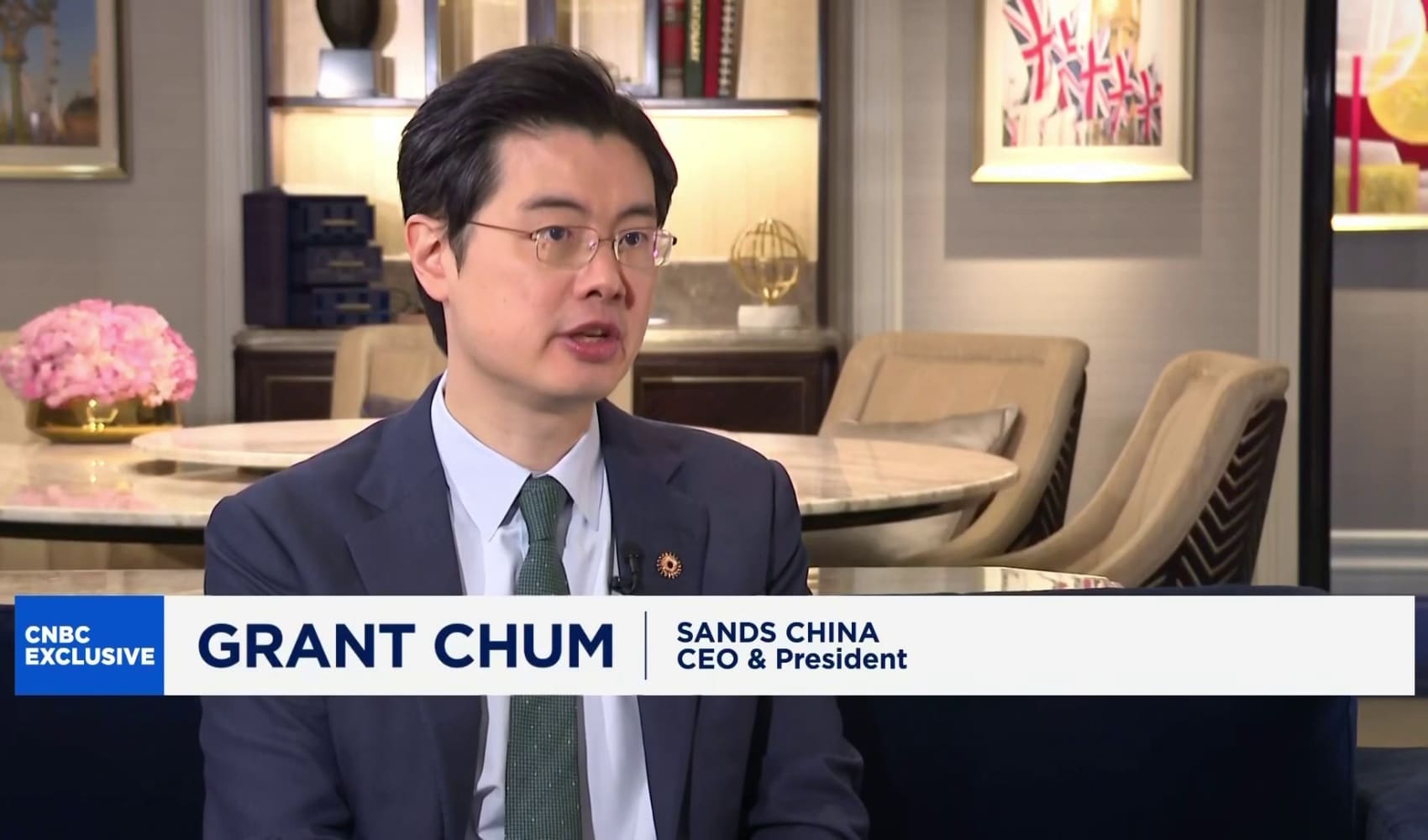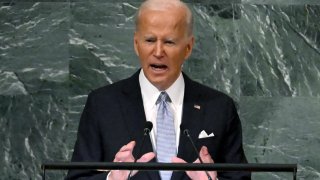
This is CNBC's live blog tracking developments on the war in Ukraine. See below for the latest updates.
President Joe Biden called on the U.N. General Assembly on Wednesday to stand in solidarity with Ukraine and oppose Russian aggression, condemning the Kremlin's invasion as an attack on the global body's founding principles.
"A permanent member of the United Nations Security Council invaded its neighbor, attempted to erase a sovereign state from the map," Biden said. "Russia has shamelessly violated the core tenets of the United Nations Charter."
Biden's speech comes after Russian President Vladimir Putin announced a partial military mobilization on Wednesday, again blaming the West for the conflict in Ukraine and saying it "wants to destroy our country."
Putin said "mobilization events" would begin today with military reservists called-up into active service. He also ordered an increase in government funding for Russian weapons production.
Money Report
Partial mobilization puts Russia on a firmer war footing (it has not yet declared war on Ukraine, despite appearances) and could mean that businesses and citizens have to contribute more to the war effort.
Elsewhere, Russian-backed officials in several parts of Ukraine have announced plans to hold referenda on joining Russia. Ukraine has slammed the upcoming votes as an attempt to legitimize Russia's invasion and slammed the prospect of "sham" and "fake" ballots.
Get a weekly recap of the latest San Francisco Bay Area housing news. >Sign up for NBC Bay Area’s Housing Deconstructed newsletter.
Zelenskyy calls Russia a state sponsor of terrorism
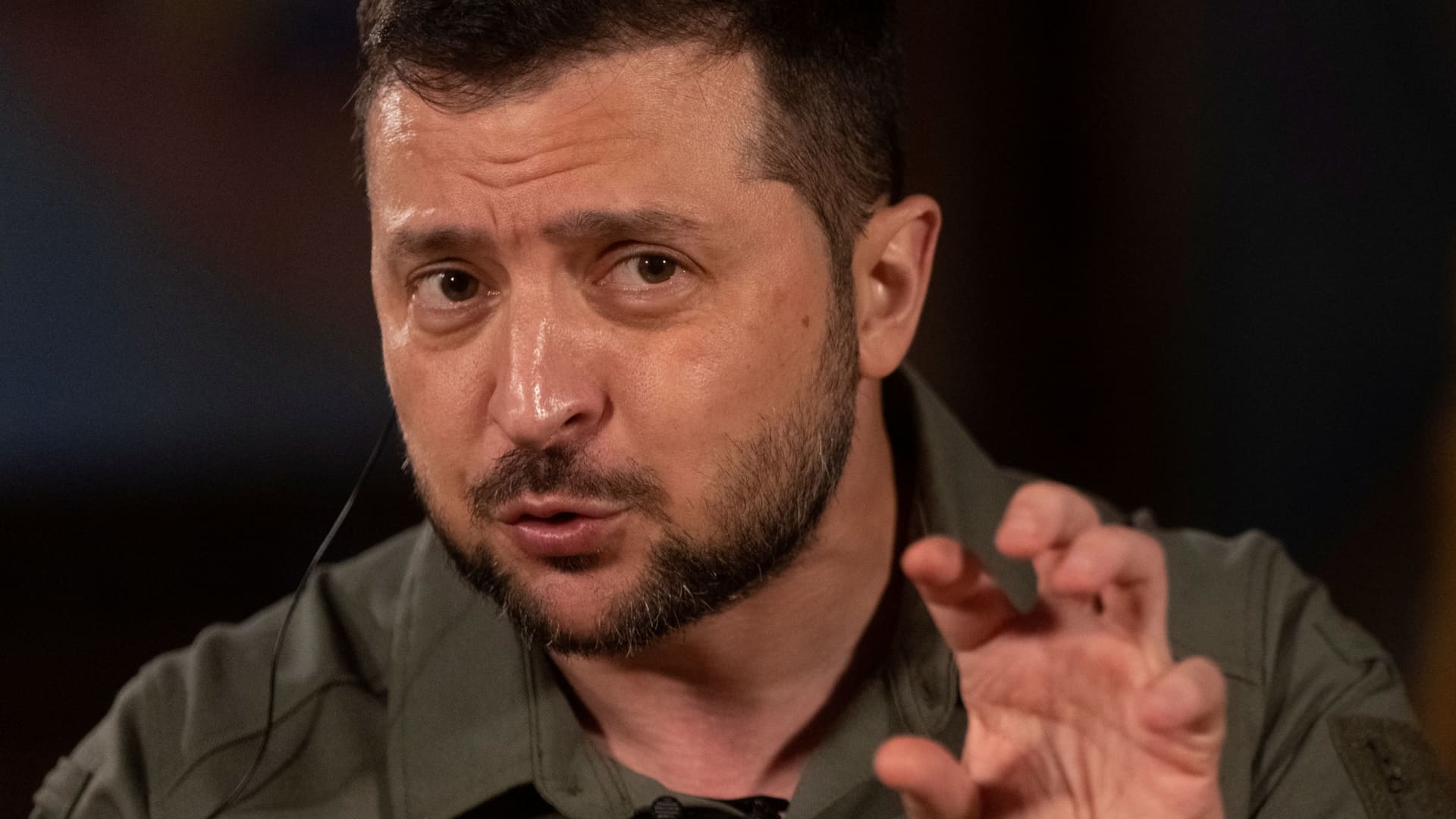
Ukrainian President Volodymyr Zelenskyy demanded that global leaders hold Russia accountable for its monthslong assault on his nation.
"Russia should pay for this war," Zelenskyy said, calling for a special U.N. tribunal to "punish Russia."
"We must finally recognize Russia as a the state of sponsor of terrorism," Zelenskyy said at the 77th U.N. General Assembly in New York City.
Zelenskyy's dramatic remarks to world leaders came on the heels of Russian President Vladimir Putin's decision to mobilize hundreds of thousands of troops for war.
Zelenskyy, who has not left his war-weary nation since Russia's full-throttle invasion in February, appeared virtually after an introduction by Ukrainian Foreign Minister Dmytro Kuleba at the 77th U.N. General Assembly.
— Amanda Macias
NATO Secretary General says allies will 'continue to step up support' for Ukraine as Putin mobilizes more troops for war
NATO Secretary-General Jens Stoltenberg met with Ukrainian Foreign Minister Dmytro Kuleba on the sidelines of the United Nations General Assembly in New York City.
"The Ukrainian people and forces inspire us all with their courage and determination," the NATO chief wrote on Twitter.
"As president Putin escalates Russia's war, it is even more important that NATO allies continue to step up support," he added, referencing the Kremlin's recent announcement to mobilize additional troops for the war in Ukraine.
Ukrainian President Volodymyr Zelenskyy is expected to deliver a dramatic speech at the U.N. later on Wednesday.
— Amanda Macias
IAEA still working on Ukraine power plant plan despite Putin bluster
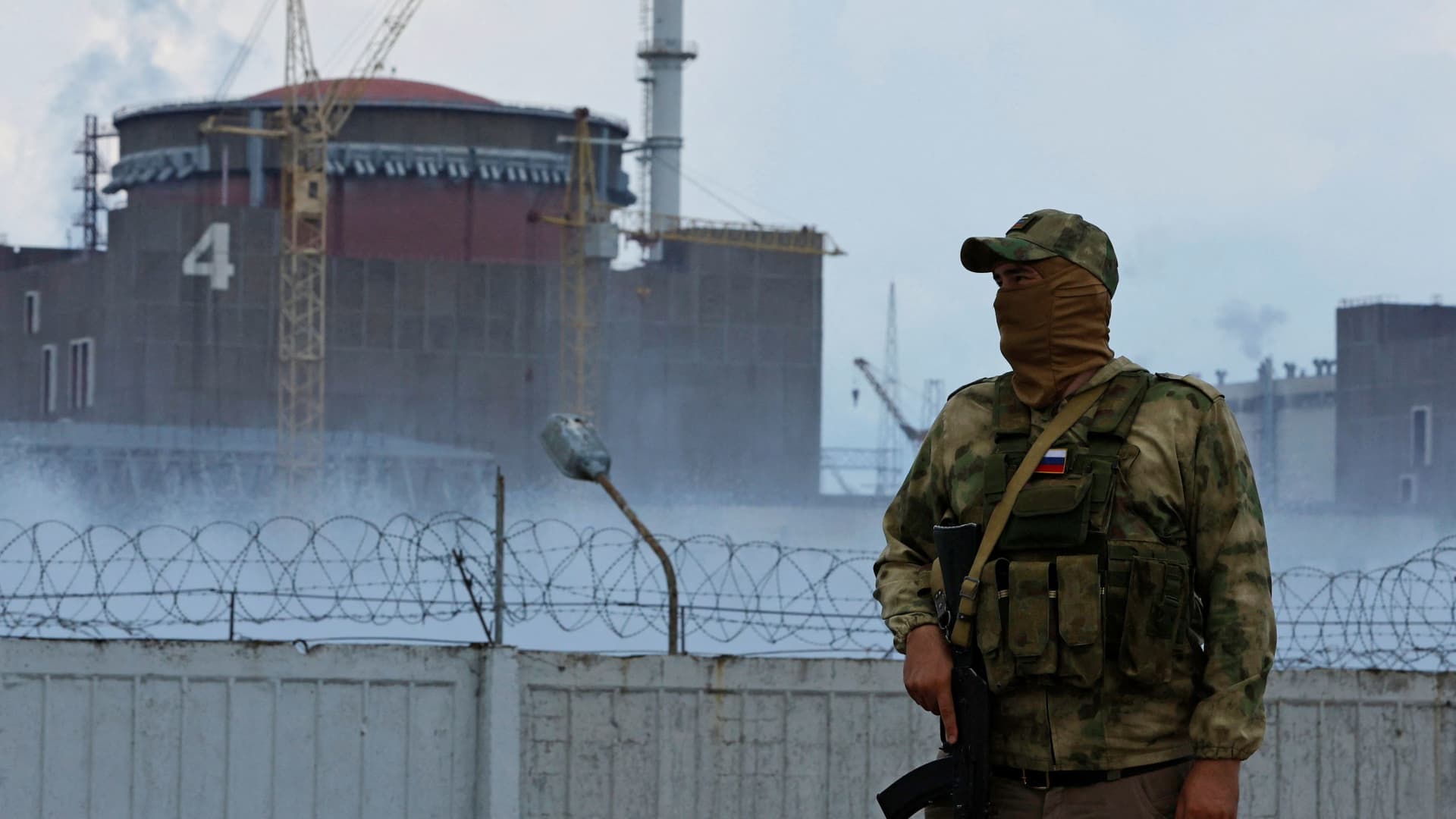
The head of the United Nations atomic agency said he would not abandon a plan to create a protection zone around the Zaporizhzhia nuclear power plant despite Russian plans to mobilize new troops and hold a referendum in the region.
Russia and Ukraine have blamed each other for shelling at the site of Europe's biggest nuclear power plant that has damaged buildings close to its six reactors and risked nuclear catastrophe, including by cutting power lines essential to cooling fuel in the reactors even though they are all shut down.
Ukrainian staff are operating under the orders of Russian forces at the site. Western states have called on Moscow to withdraw its troops.
"Even in the worst of conditions diplomacy should never stop. We can't throw our hands up and say look at what's being said, go away and hope that something will happen to solve this situation," Rafael Grossi, chief of the International Atomic Energy Agency, told reporters on the sidelines of the United Nations General Assembly.
"It's our responsibility to do it by proposing pragmatic, realistic and physical proposals on the table."
— Reuters
Biden meets U.K. Prime Minister Liz Truss in first formal bilateral since her ascension to the office
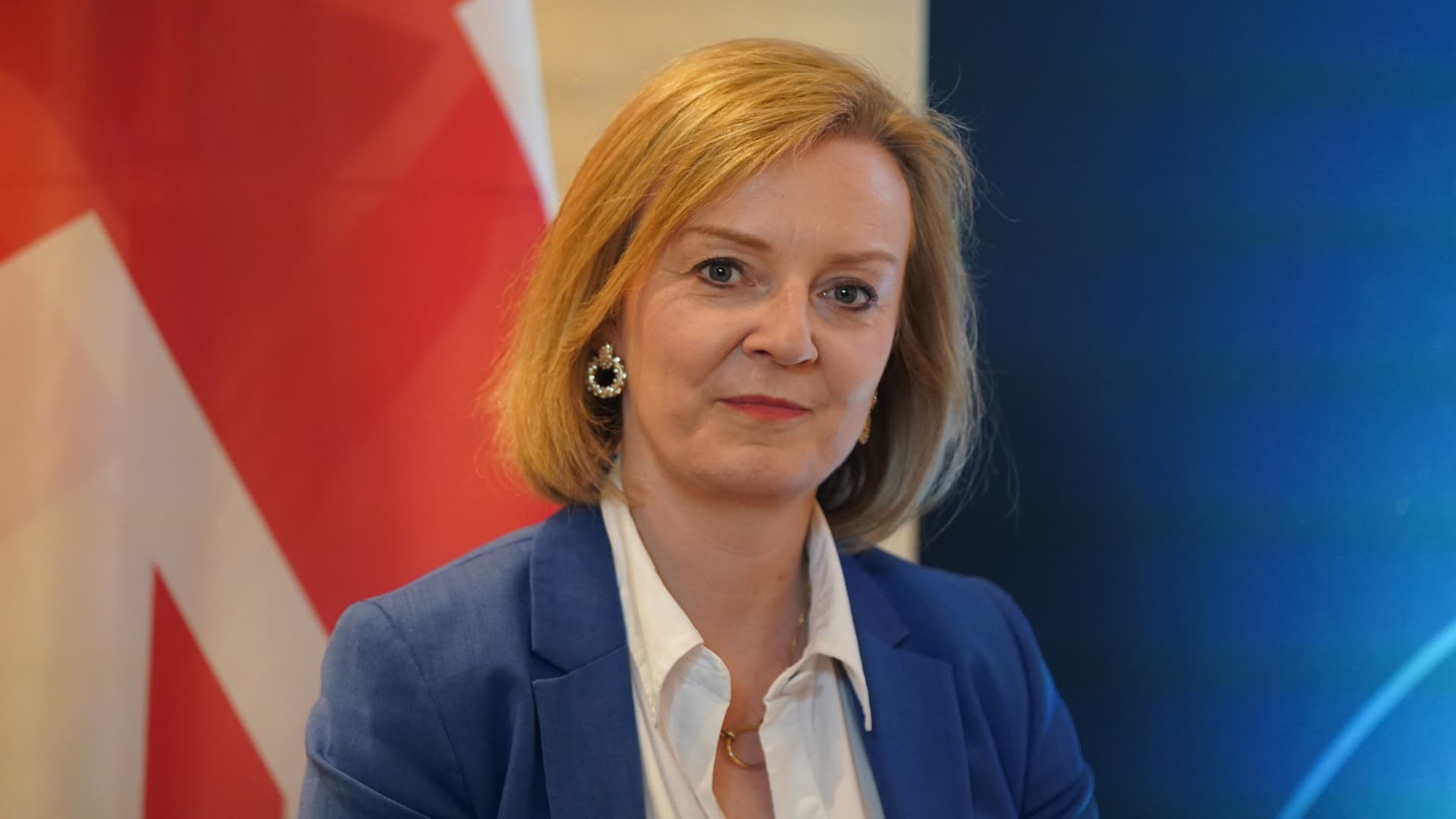
President Joe Biden met with U.K. Prime Minster Liz Truss on the sidelines of the U.N. General Assembly. The two leaders were originally slated to meet last week in London at No. 10 Downing Street.
Biden began the bilateral meeting by offering his condolences for the passing of Queen Elizabeth II. Truss thanked Biden and first lady Jill Biden for attending the state funeral for the late monarch.
She also thanked Biden for his leadership as a "steadfast ally." Truss said that she enjoyed working with his Secretary of State Antony Blinken in her previous role as U.K. foreign minister.
Truss, ascended to the prime minster role earlier this month, following Boris Johnson's resignation.
The president did not respond to questions from reporters.
— Amanda Macias
Biden meets with U.N. chief following General Assembly address
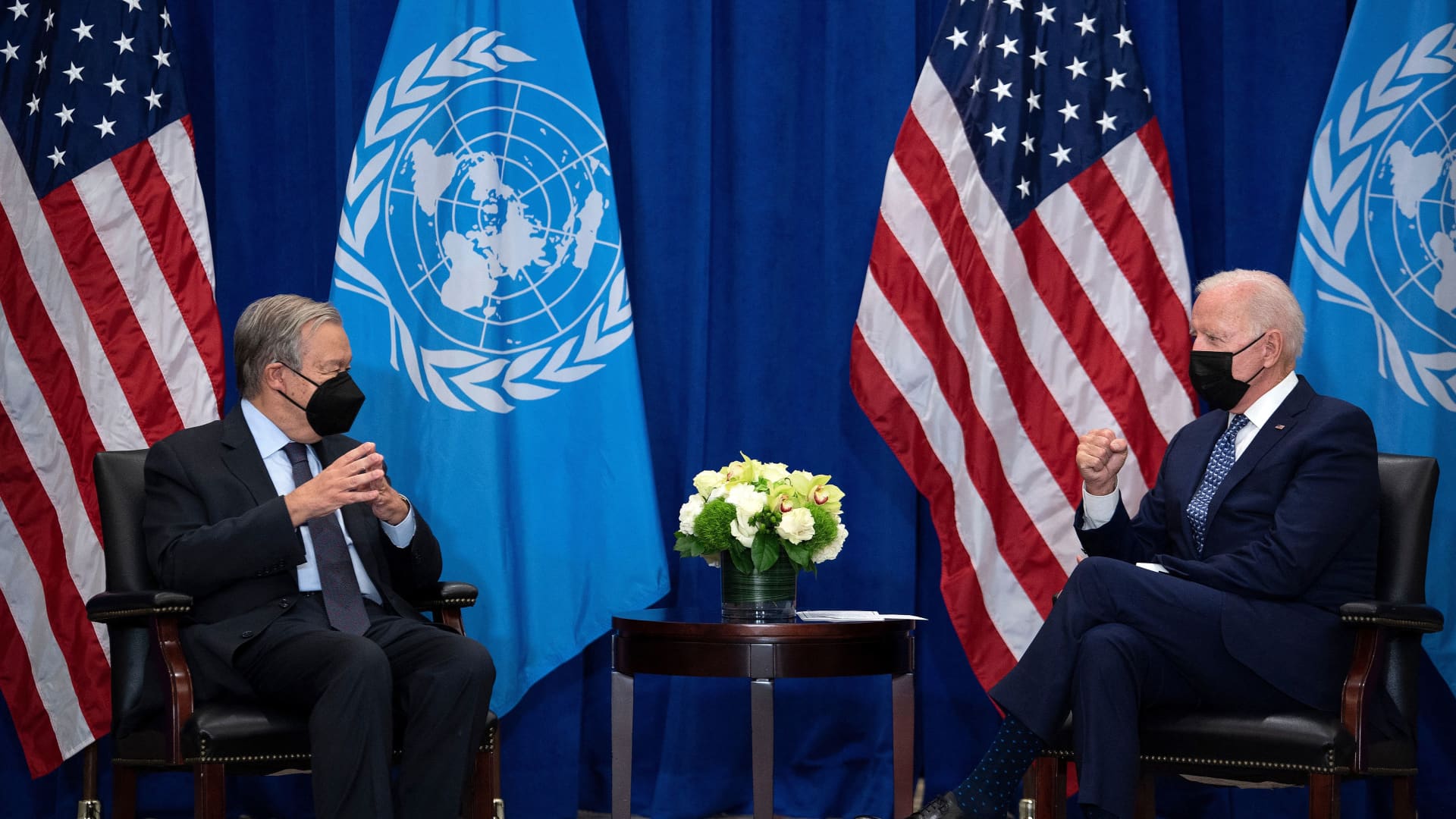
President Joe Biden met with U.N. Secretary-General Antonio Guterres on the heels of his address to the 77th United Nations General Assembly in New York City.
Biden said he did not have an additional response to Russian President Vladimir Putin's order to mobilize some 300,000 additional troops to fight in Ukraine when asked by reporters at the top of the meeting.
During Biden's address, he slammed Moscow's full-throttle assault on Ukraine and pledged to continue to support the war-torn nation with weaponry and humanitarian aid.
Biden and Guterres are expected to address other issues aside from the war in Ukraine during their closed-door meeting.
— Amanda Macias
Biden calls for U.N. member states to stand with Ukraine and oppose Russian aggression
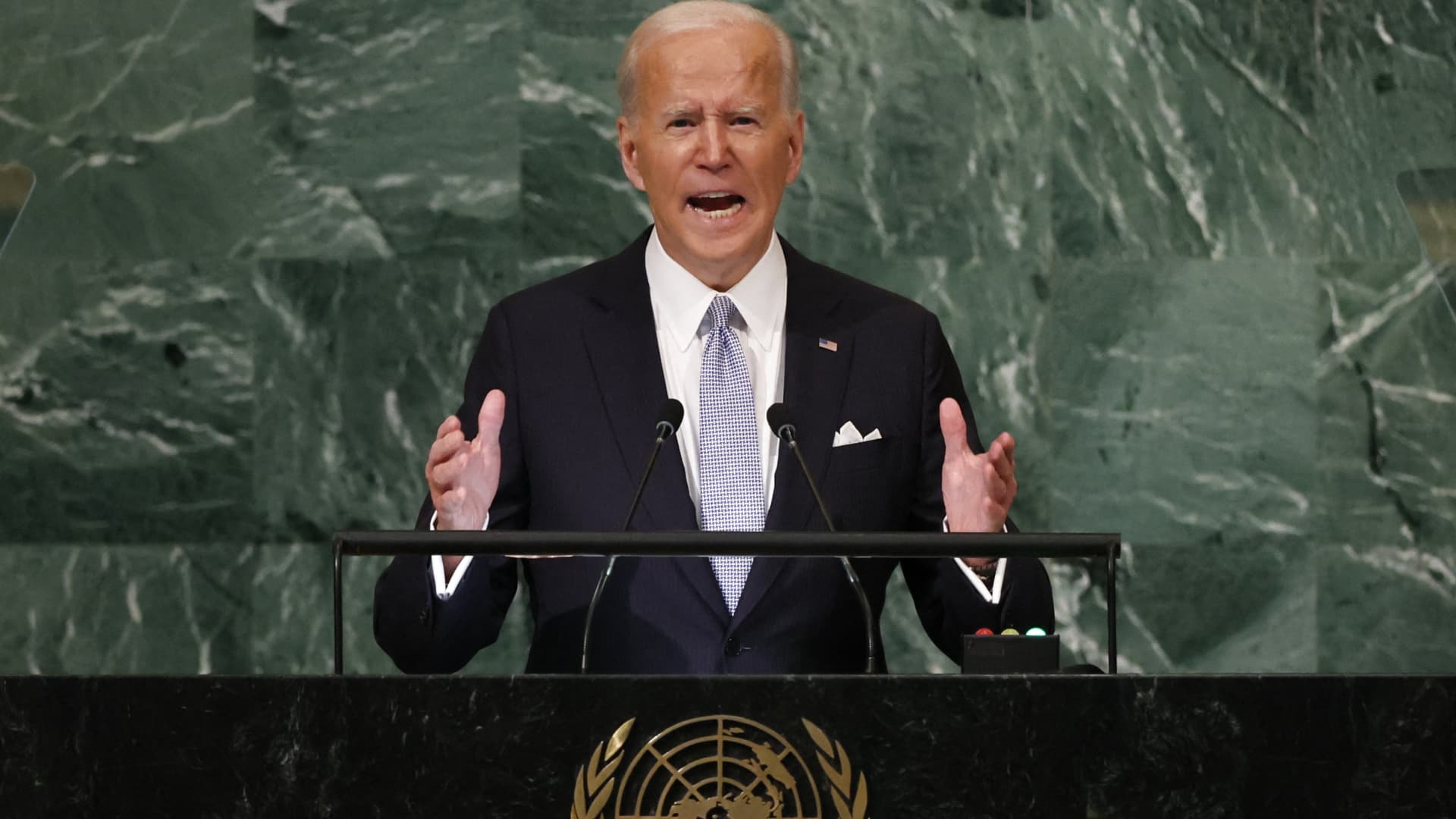
President Joe Biden called for U.N. member states to stand with Ukraine and oppose Russian aggression, warning that the Kremlin's invasion of its smaller neighbor threatened the independence and sovereignty of nations around the world.
"This war is about extinguishing Ukraine's right to exist as a state plain and simple, and Ukraine's right to exist as a people," Biden told the U.N. General Assembly. "Whoever you are, wherever you live, whatever you believe -- that should make your blood run cold."
Biden condemned Russia's invasion as a clear violation of the U.N. charter. The U.S. president said the nations of the world had an obligation to put their political differences aside and defend the global body's founding principles by standing in solidarity with Ukraine.
"If nations can pursue their imperial ambitions without consequences, then we put at risk everything this very institution stands for," Biden said. The president called for the U.N. to be "clear, firm and unwavering in our resolve."
"Ukraine has the same rights that belong to every sovereign nation. We will stand in solidarity with Ukraine, we will stand in solidarity against Russia's aggression – period," Biden said.
-- Spencer Kimball
Zelenskyy set to deliver dramatic remarks to U.N. as Russia mobilizes more troops for war
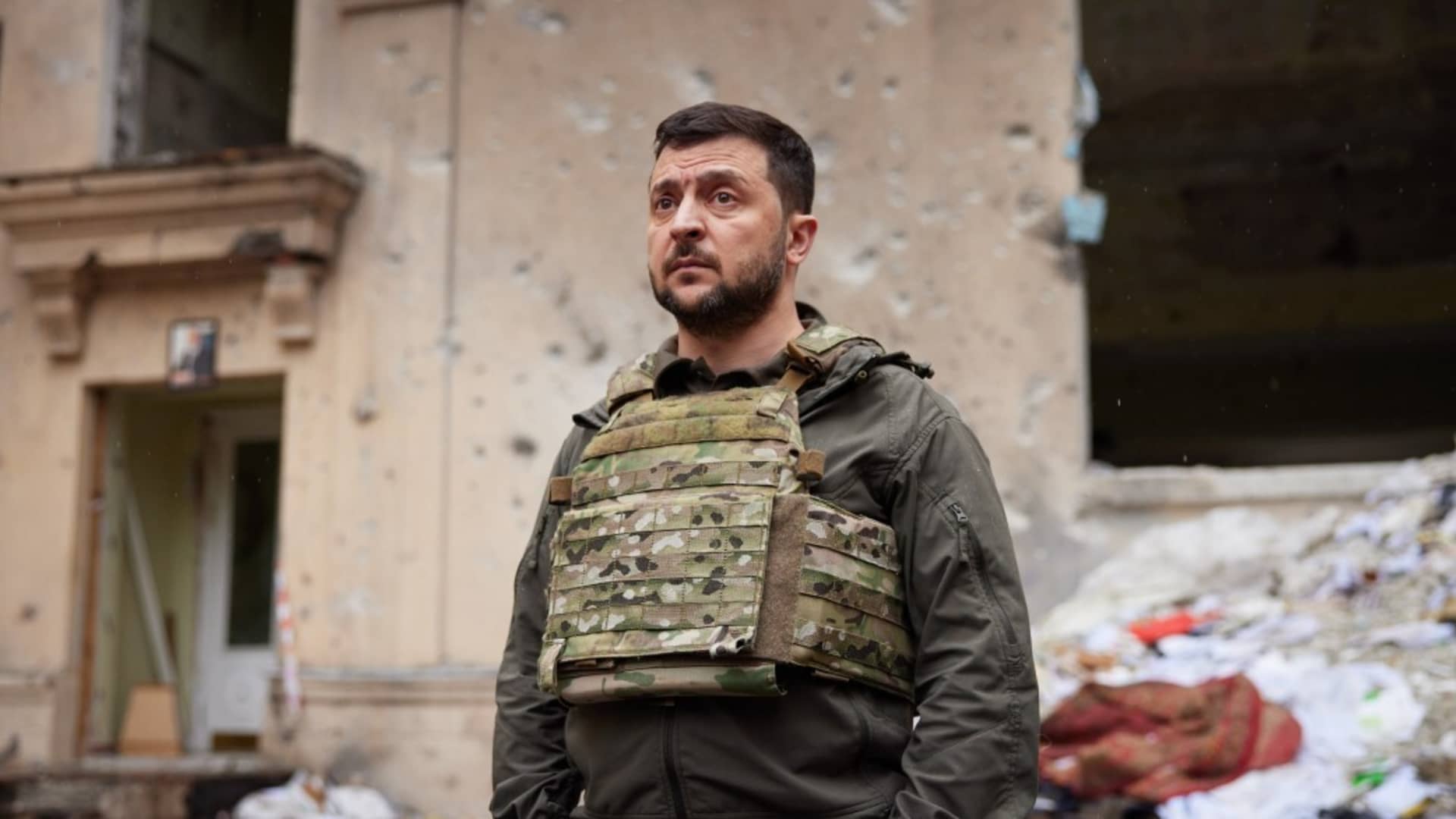
Ukrainian President Volodymyr Zelenskyy will deliver dramatic remarks to world leaders Wednesday, only hours after Russia moved to mobilize hundreds of thousands of troops for its months long assault on its ex-Soviet neighbor.
Zelenskyy, who has not left his war weary nation since Russia's full throttle attack in late February, will speak after a stunning Ukrainian counteroffensive reclaimed vast swaths of land lost early in the war.
While nearly every leader who has stepped behind the famed U.N. speaker's rostrum has condemned Russia for its ongoing assault, Zelenskyy is expected to urge leaders to publicly establish where they stand on the war.
He will call on countries such as China, the world's second largest economy, to abandon its neutrality.
— Amanda Macias
Biden expected to slam Russia's war in Ukraine in U.N. speech
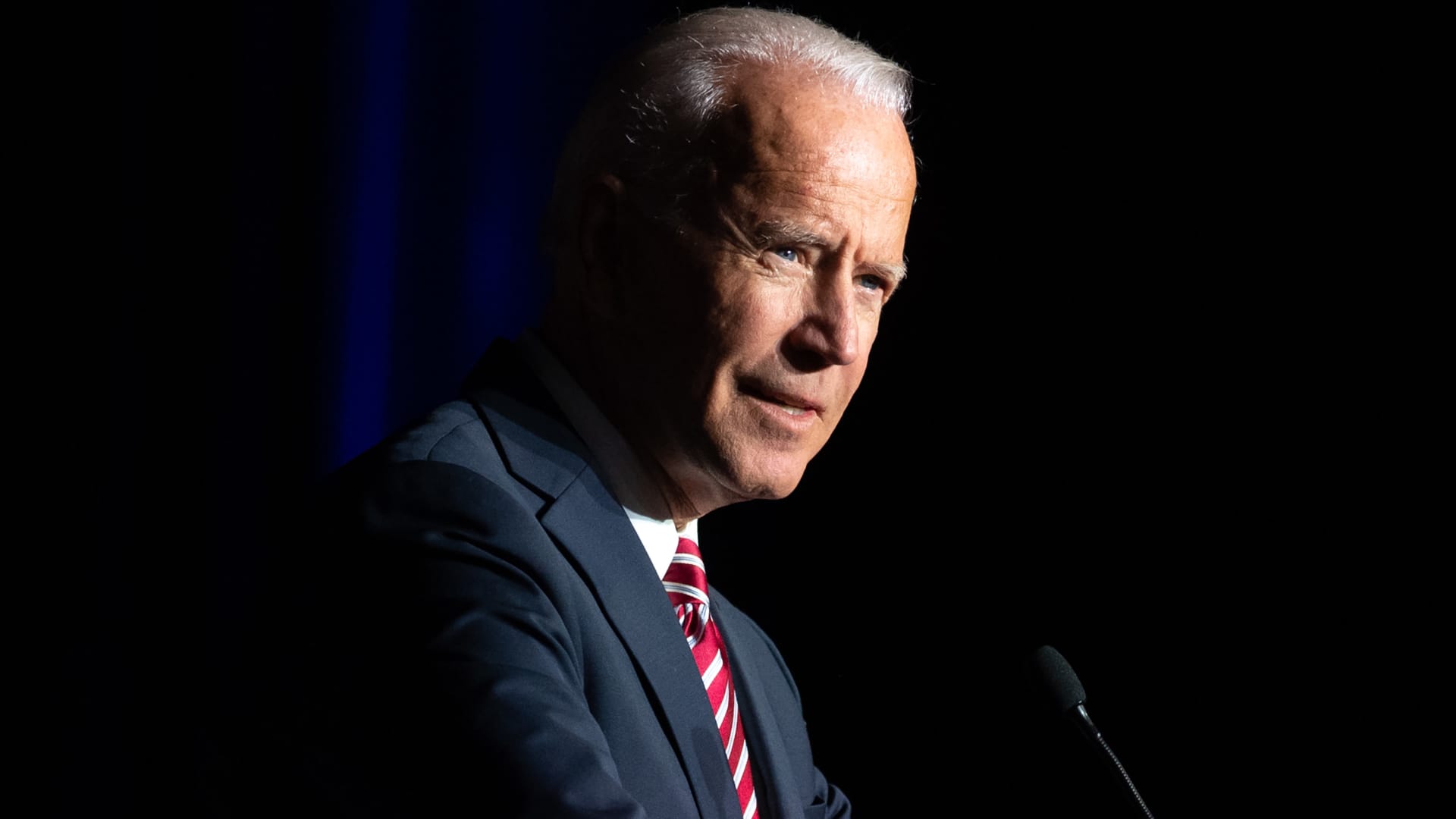
President Joe Biden is expected to slam Russia's ongoing war in Ukraine and galvanize allies to support Kyiv in its era-defining fight for sovereignty.
Biden's address to the 77th United Nations General Assembly comes as Russia's war in Ukraine marches past its 200th day, while governments continue to grapple with the fallout of the Covid-19 pandemic and as climate change uncertainties mount.
Following his speech before the international forum, Biden will meet with U.N. Secretary-General Antonio Guterres and then separately with U.K. Prime Minister Liz Truss.
Linda Thomas-Greenfield, Biden's ambassador to the United Nations, told reporters last week that a U.S. delegation will meet with a Ukrainian delegation on the sidelines of the U.N. General Assembly. She said that no such meeting was planned with the Russian delegation.
— Amanda Macias
Pope says Ukrainians subjected to 'savageness, monstrosities and torture'
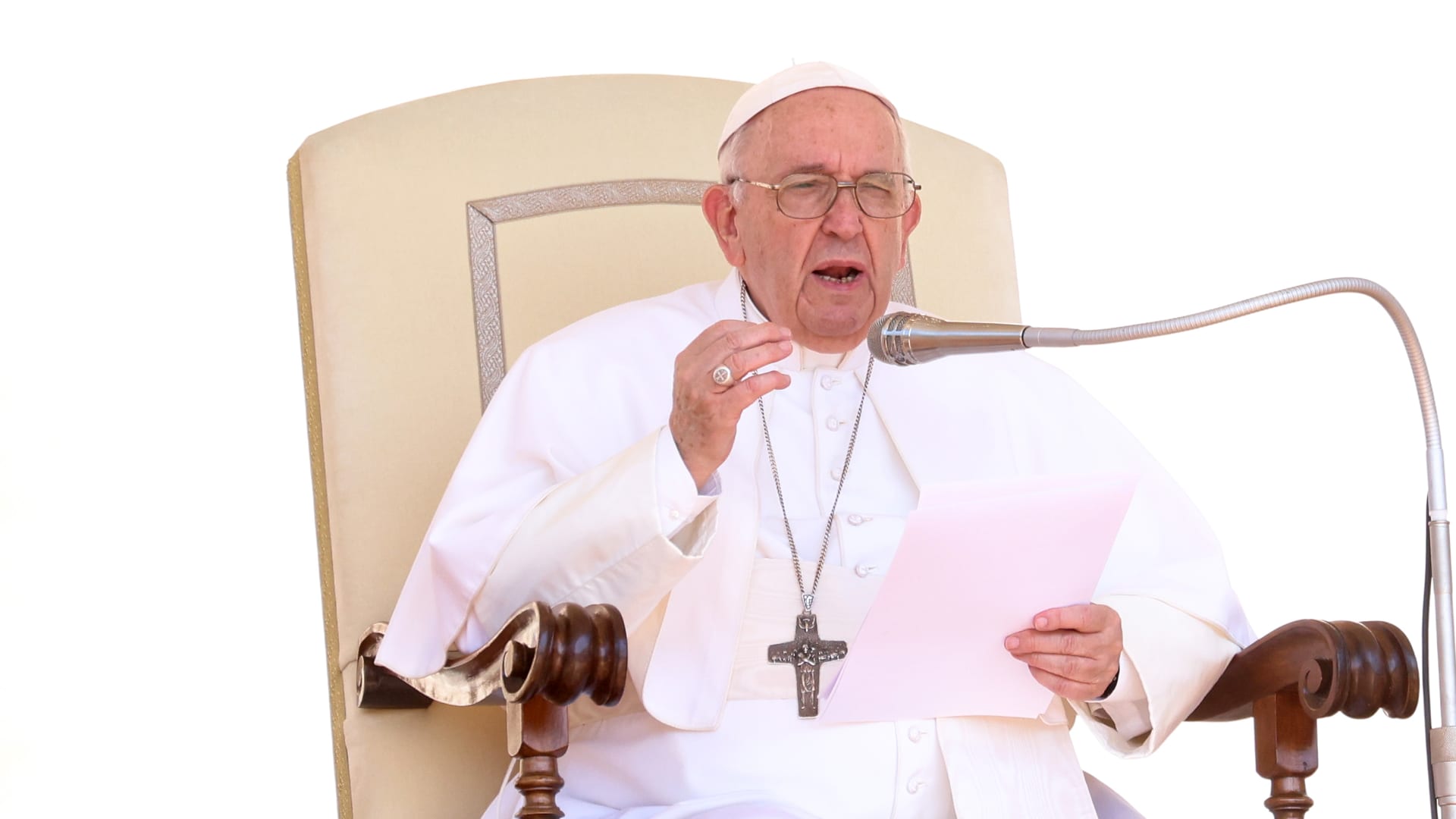
The Pope in a weekly address prayed for the tortured corpses left in the aftermath of Russia's war in Ukraine.
"I would like to mention the terrible situation in tormented Ukraine. Cardinal Krajewski went there for the fourth time. Yesterday he telephoned me, he is spending time there, helping in the area of Odesa and bringing closeness," Pope Francis said, according to an NBC News translation.
"He told me about the pain of these people, the savagery, the monstrosities, the tortured corpses they find. Let us unite ourselves to these people who are so noble and martyred," the Pope added.
— Amanda Macias
Partial mobilization is 'great tragedy' for Russian people, Ukraine official says
A top Ukrainian official has described Russia's announcement of a partial mobilization of its military as a "great tragedy" for the Russian people.
The move, announced by President Putin on Wednesday morning, will see around 300,000 military reservists called-up and sent to Ukraine.
Serhiy Nykyforov, spokesperson to the Office of the President of Ukraine, told NBC's Erin McLaughlin that "300,000 of people who were conscripts just yesterday will be sent to the places where recidivist thugs, mercenaries, and vaunted Kadyrov [Ramzan Kadyrov, head of the Chechen Republic] fighters failed. It is clear what will happen to these guys there, whom, as we saw in the first days of the invasion, the army cannot properly train and provide," he said.
"This is a recognition of the incapacity of the Russian professional army, which has failed in all its tasks. As we can see, the Russian authorities intend to compensate for this with violence and repression against their own people. The sooner it stops, the fewer Russian sons will go to die at the front," he added.
— Holly Ellyatt
Qatar airways will continue flying to Russia, says CEO
Qatar airways' CEO H.E. Akbar Al Baker on Wednesday said that the airlines will continue flying to Russia as long as it is operationally safe to do so.
"We will continue to fly to Russia, we will continue to serve the people," he told CNBC's Hadley Gamble on Wednesday. "We are not a political institution. We are an industry that serves the common people."
The CEO said that China's Covid policies are "the smallest worry" for him, especially in contrast to the potential of the escalation of the Ukraine-Russia war, which he said could fuel inflation and put fewer "passengers in planes."
"Like every other airline that is still operating into Russia, we will continue to operate into Russia, as long as our operation into Russia is going to be safe," he said.
— Lee Ying Shan
Escalation of economic war against Russia is still possible, analyst says
Russia may be almost entirely cut off from global markets, but the West will look to bring countries like India and China together in the economic war effort, according to the Foreign Policy Research Institute's Max Hess.
Russia's partial mobilization will see 300,000 reservists called up
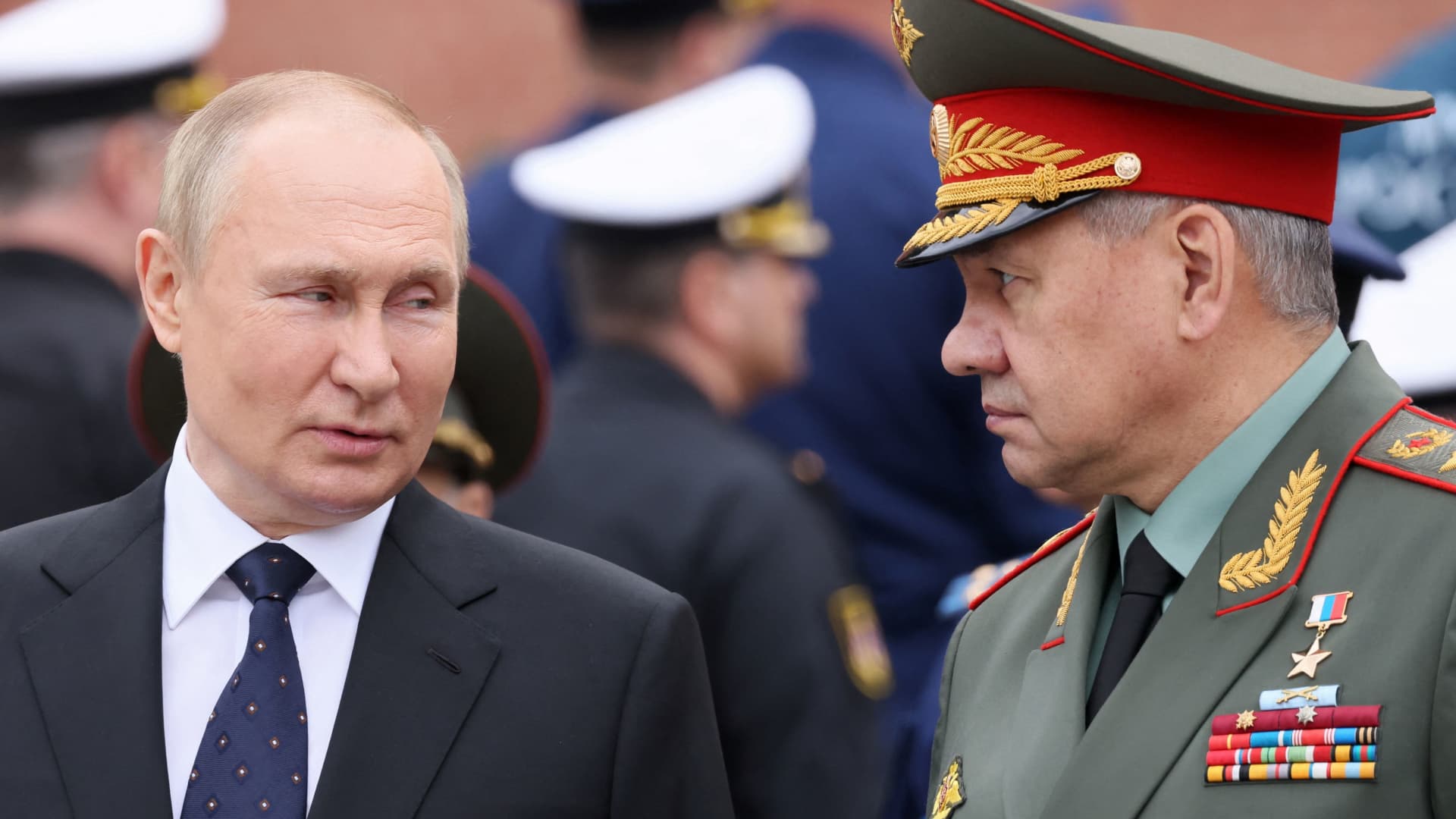
Russian Defense Minister Sergei Shoigu said on Wednesday that President Vladimir Putin's decree on partial mobilisation would see 300,000 additional personnel called up to serve in Russia's military campaign in Ukraine, Reuters reported.
In an interview with Russian state television, Shoigu said that students and those who served as conscripts would not be called up, and that the majority of Russia's millions-strong reserves would not be drafted.
Those being called up would receive military training, the minister added.
— Reuters
Oil prices rise after Putin announces partial military mobilization
Oil futures rose 3% after Russia's president, Vladimir Putin, said there would be a partial military mobilization in the country.
Brent crude futures rose 3.07% to $93.40 per barrel, and West Texas Intermediate futures added 3.13% to $86.57 per barrel.
— Abigail Ng
The UN Security Council is 'imperfect and paralyzed' but not dead, former delegate says
"The [United Nations] Security Council is imperfect and paralyzed, but it is not dead" said former U.S. delegate to the United Nations, Hugh Dugan.
Dugan's comments come as world leaders gather for a UN General Assembly meeting in New York.
In response to a question of whether the UN body can still work without China and Russia, Dugan said that ministers from both countries will be present, and that the strength of the UN is in its "power to convene" and draw 160 world leaders to be present for a discussion.
"Those who don't show up know that if they're not at the table, they're going to be on the menu," Dugan added. It's widely expected that the war in Ukraine and global food security will dominate discussions.
— Lee Ying Shan
‘Path to oblivion’: Ukraine military gains could deepen Russia’s economic problems
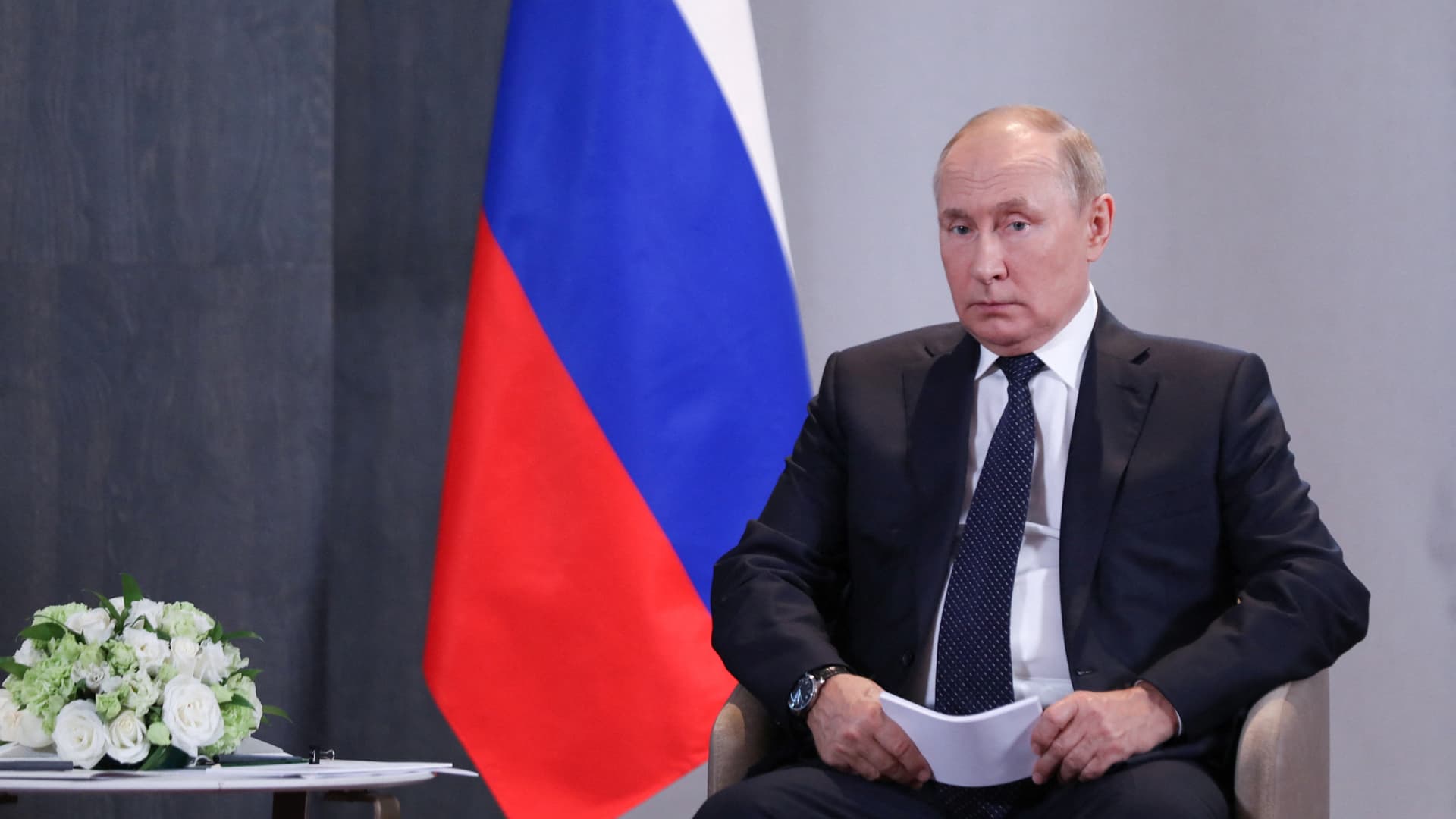
Ukraine's counteroffensive, which has seen the country's forces recapture vast swathes of Russian-occupied territory, could be compounding Russia's economic troubles, as international sanctions continue to hammer its fortunes.
After the Ukrainian military's stunning success in recent weeks, which saw it recapture swathes of Russian-occupied territory in the northeast and south of the country, Berenberg Chief Economist Holger Schmieding suggested the losses could exert further economic pressure on Moscow.
"Even more so than before, the Russian economy looks set to descend into a gradually deepening recession," Schmieding said in a note last week.
"The mounting costs of a war that is not going well for [Russian President Vladimir] Putin, the costs of suppressing domestic dissent and the slow but pernicious impact of sanctions will likely bring down the Russian economy faster than the Soviet Union crumbled some 30 years ago."
- Elliot Smith
Putin announces partial military mobilization in escalatory move
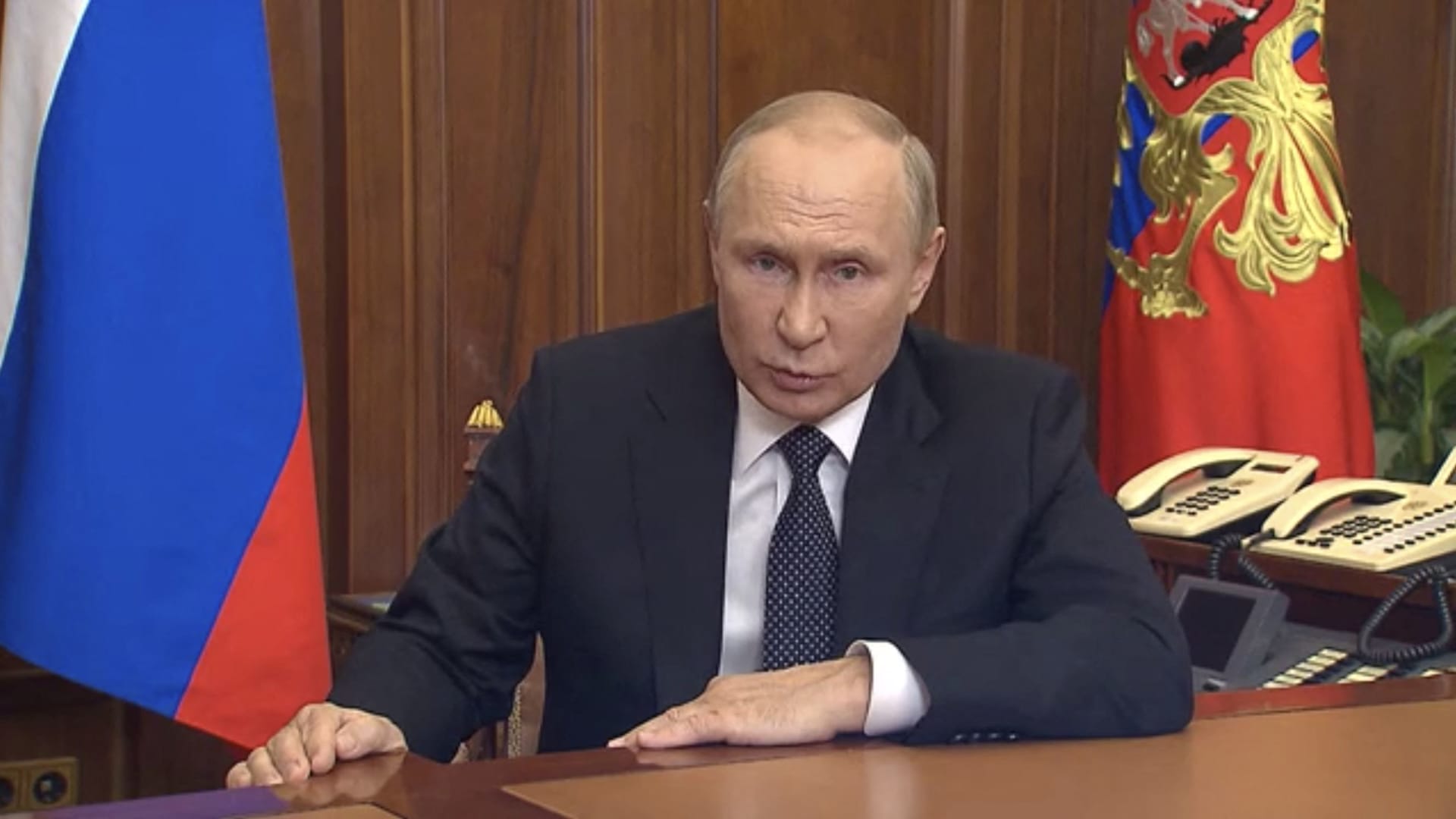
Russian President Vladimir Putin on Wednesday announced a partial military mobilization in Russia, putting the country's people and economy on a wartime footing as Moscow's invasion of Ukraine continues.
In an unusual, pre-recorded televised announcement, Putin said the West "wants to destroy our country" and claimed it had tried to "turn Ukraine's people into cannon fodder," in comments translated by Reuters.
Putin has previously blamed Western nations for starting a proxy war with Russia in Ukraine and again threatened the West with a military response, saying Moscow had "lots of weapons to reply."
He said "mobilization events" would begin Wednesday without providing many further details, aside from saying that he had ordered an increase in government funding to boost Russia's weapons production.
A partial mobilization is a hazy concept but it puts Russia on a firmer war footing (it has not yet declared war on Ukraine, despite appearances, and calls its invasion a "special military operation") but partial mobilization could mean that Russian businesses and citizens have to contribute more to the war effort.
— Holly Ellyatt
'Sham' votes in occupied regions on joining Russia are 'doomed to fail,' official says
Ukrainian officials have dismissed plans by Russian-occupied parts of the country to hold referenda on whether to join Russia, saying the move is "doomed to fail."
Ukraine's Foreign Minister Dmytro Kuleba said the "sham" votes on joining Russia — announced on Tuesday by Russia's proxy leaders and officials installed in occupied parts of the country — did not change anything.
Yuriy Sak, an advisor to Ukraine's Defense Minister Oleksii Reznikov, told CNBC Tuesday that such "fake" votes are "doomed to fail" for several reasons.
"This is the desperate, face-saving attempt which they're trying to use to compensate for the humiliation that they have suffered on the battlefield as a result of the Ukrainian army's counter offensive, both in Kharkiv region and in Kherson," he said.
"The second point is that, regardless of what they do, this will not stop the Ukrainian army and this will not be recognized by any members of the international community."
Sak said that most people in those regions did not support becoming a part of Russia, particularly after seeing how Russian forces had behaved during the conflict in which it has been accused of multiple war crimes. Russia denies it has targeted civilians or civilian infrastructure, despite evidence to the contrary.
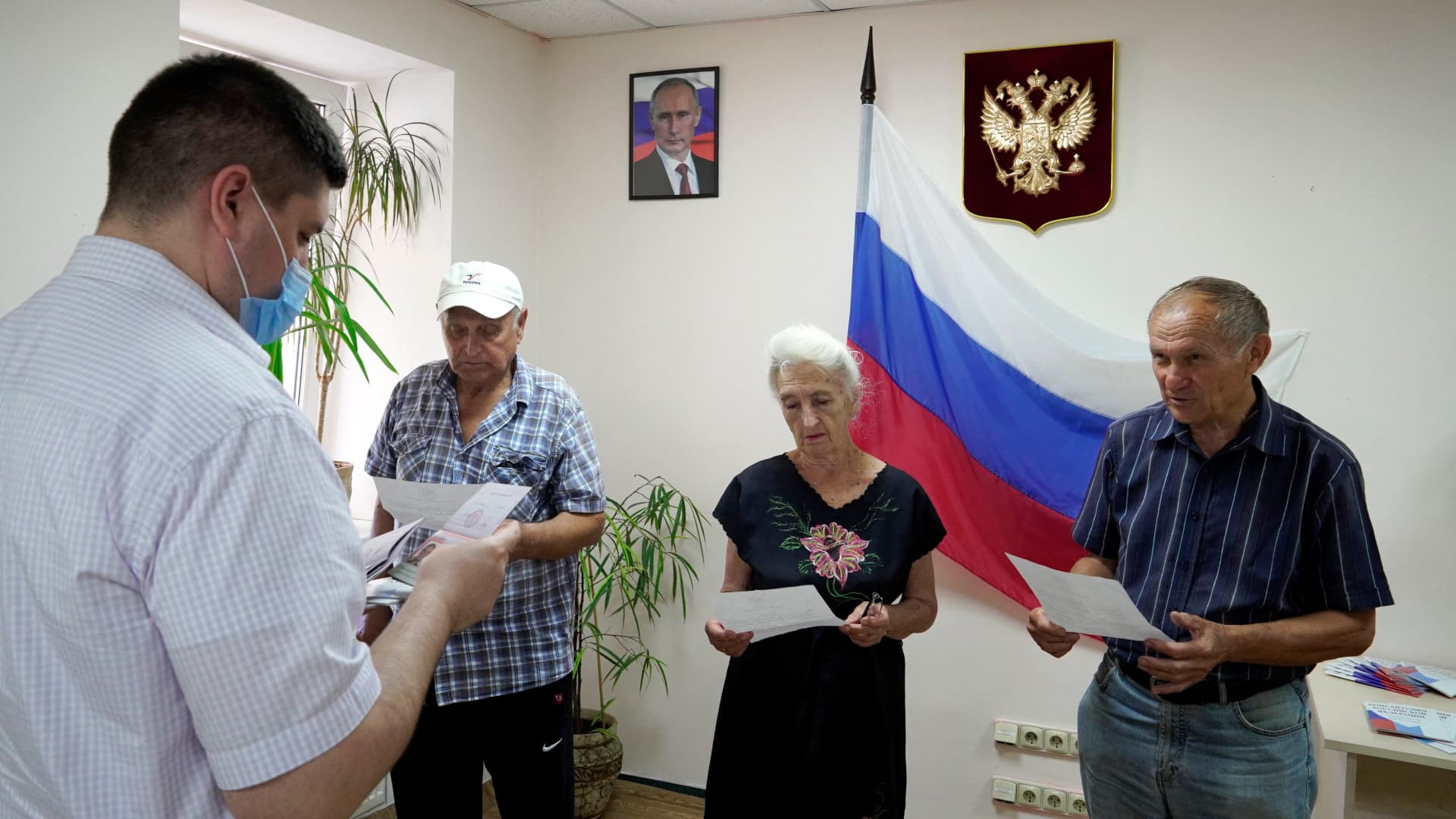
"The third, very important point is that local populations in the temporarily-occupied territories — and we're seeing it now as we are de-occupying these territories — they are not supportive of the occupants. They're not supportive of the aggressor. So these fake referendums are doomed to fail, from whatever angle or aspect you look at it," Sak said.
— Holly Ellyatt
China’s Xi and India’s Modi were the last two people Putin wanted to see give him the cold shoulder
At last week's Shanghai Cooperation Organisation summit in Samarkand, Uzbekistan, there were clear signs that China's Xi Jinping and India's Narendra Modi are growing wary of Russia's invasion of Ukraine.
China and India like cheap oil from Russia, but New Delhi is concerned about food and energy insecurity. And Beijing is unhappy that its reputation is being dragged through the mud, especially among European countries.
— Ted Kemp
Germany's Chancellor says Putin must recognize he can't win in Ukraine
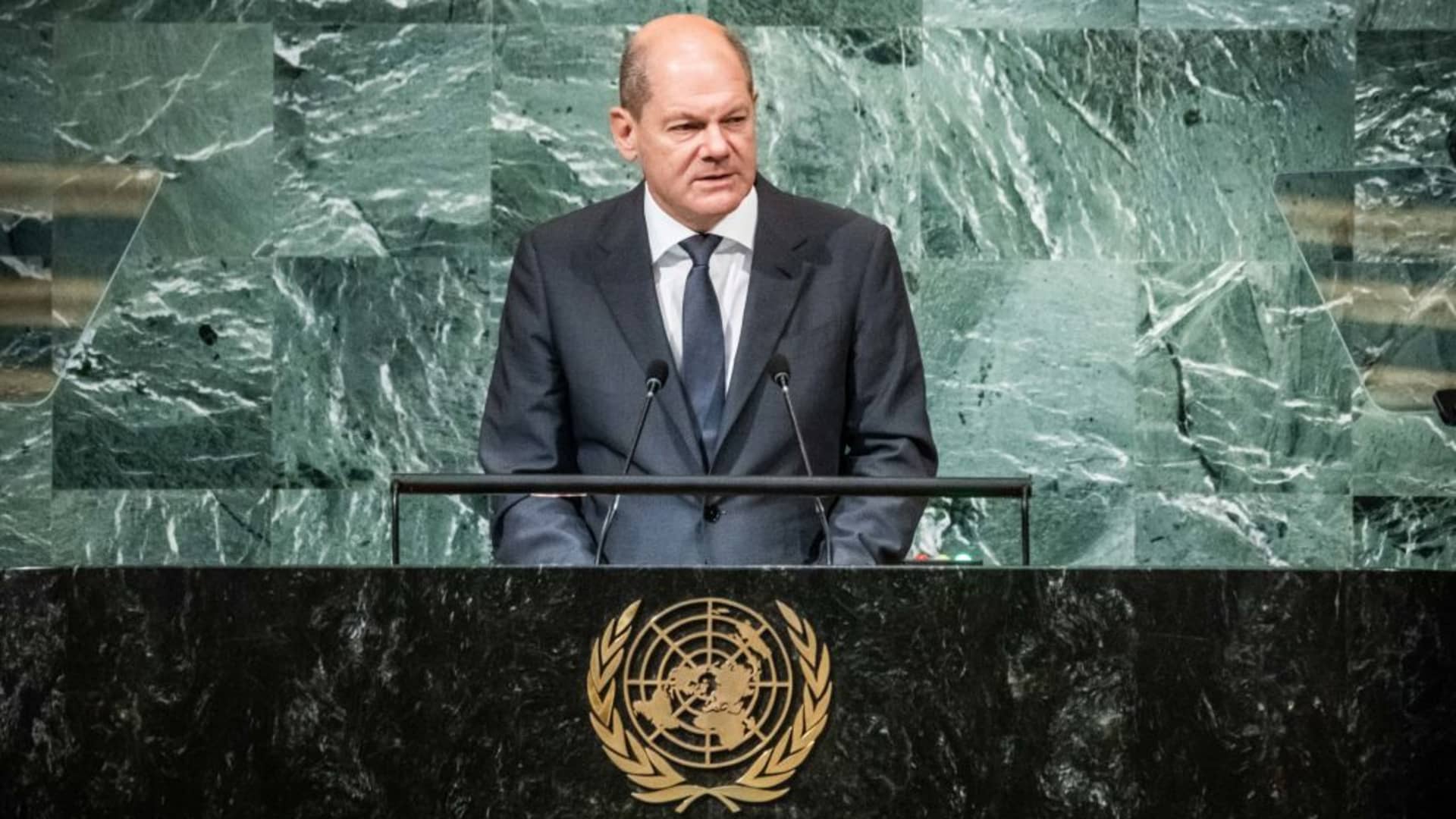
Russian President Vladimir Putin will only give up his "imperial ambitions" that risk destroying Ukraine and Russia if he recognizes he cannot win the war, German Chancellor Olaf Scholz said on Tuesday.
"This is why we will not accept any peace dictated by Russia and this is why Ukraine must be able to fend off Russia's attack," Scholz said in his first address to the United Nations General Assembly.
The return of imperialism, with Putin's war on Ukraine, was not just a disaster for Europe but for the global, rules-based peace order, the chancellor said. He called on the U.N. to defend this from those who would prefer a world where the "strong rule the weak".
"Do we watch helpless as some want to catapult us back into a world order where war is a common means of politics, independent nations must join their stronger neighbors or colonial masters, and prosperity and human rights are a privilege for the lucky few?" Scholz asked.
— Reuters
Blinken calls Russian referenda attempts a 'sign of weakness' and a 'sign of Russian failure'
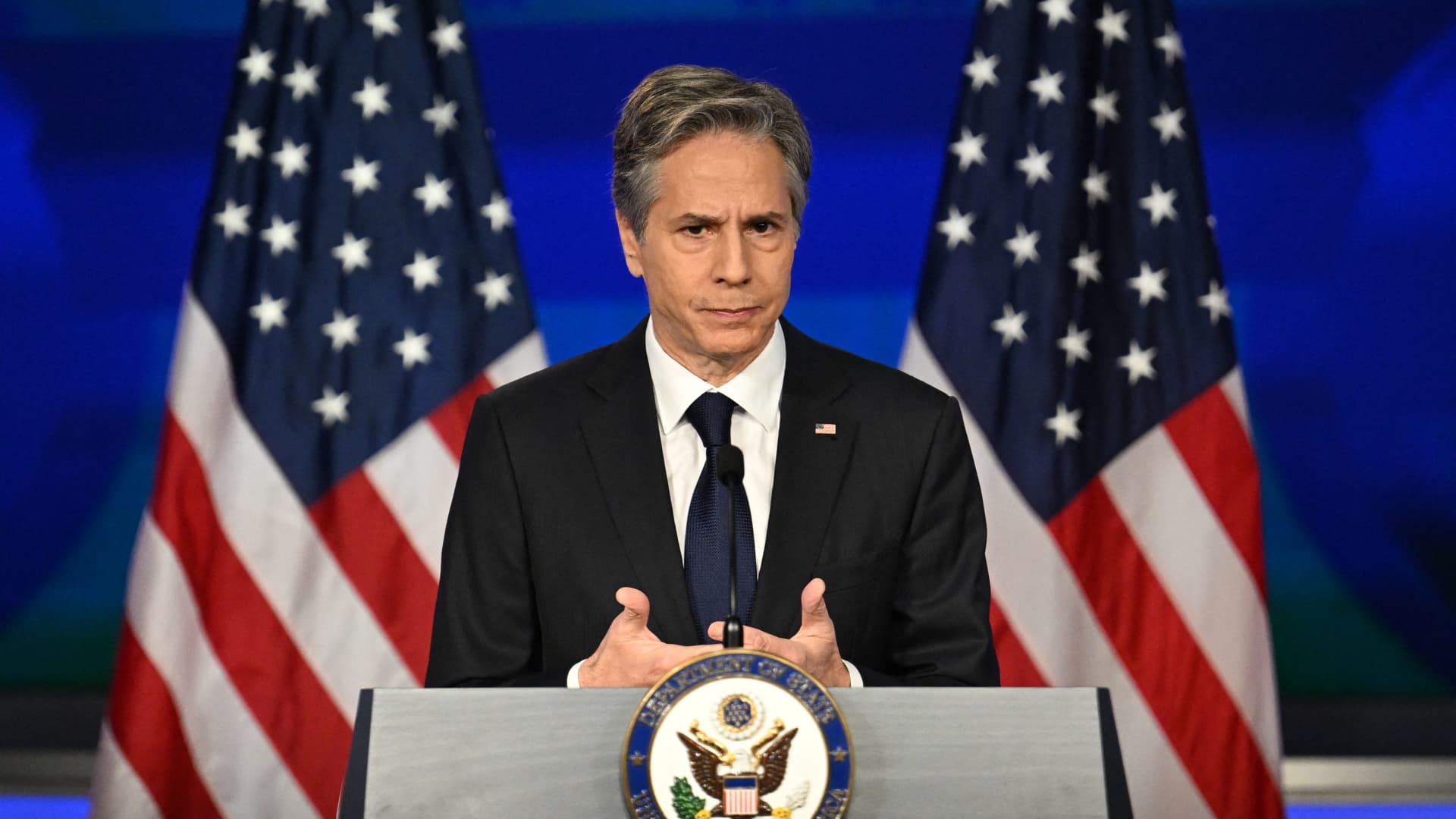
Secretary of State Antony Blinken slammed the Kremlin's attempt to hold a referendum in parts of Ukraine and called the move a "sign of Russian failure."
"We've seen reports that Russia is now considering proceeding with these sham referenda in Ukraine, something we said that they were going to do for many months," Blinken told reporters on the sidelines of the 77th United Nations General Assembly in New York City.
"That would then lead to them claiming the annexation of Ukrainian territory," he said, adding that if the referenda proceeds, the United States will never recognize the outcome.
"The sham referenda and the potential mobilization of additional forces isn't a sign of strength. On the contrary, it's a sign of weakness, it's a sign of Russian failure," America's top diplomat added.
— Amanda Macias
'The Russians can do whatever they want. It will not change anything,' Ukraine's Kuleba says
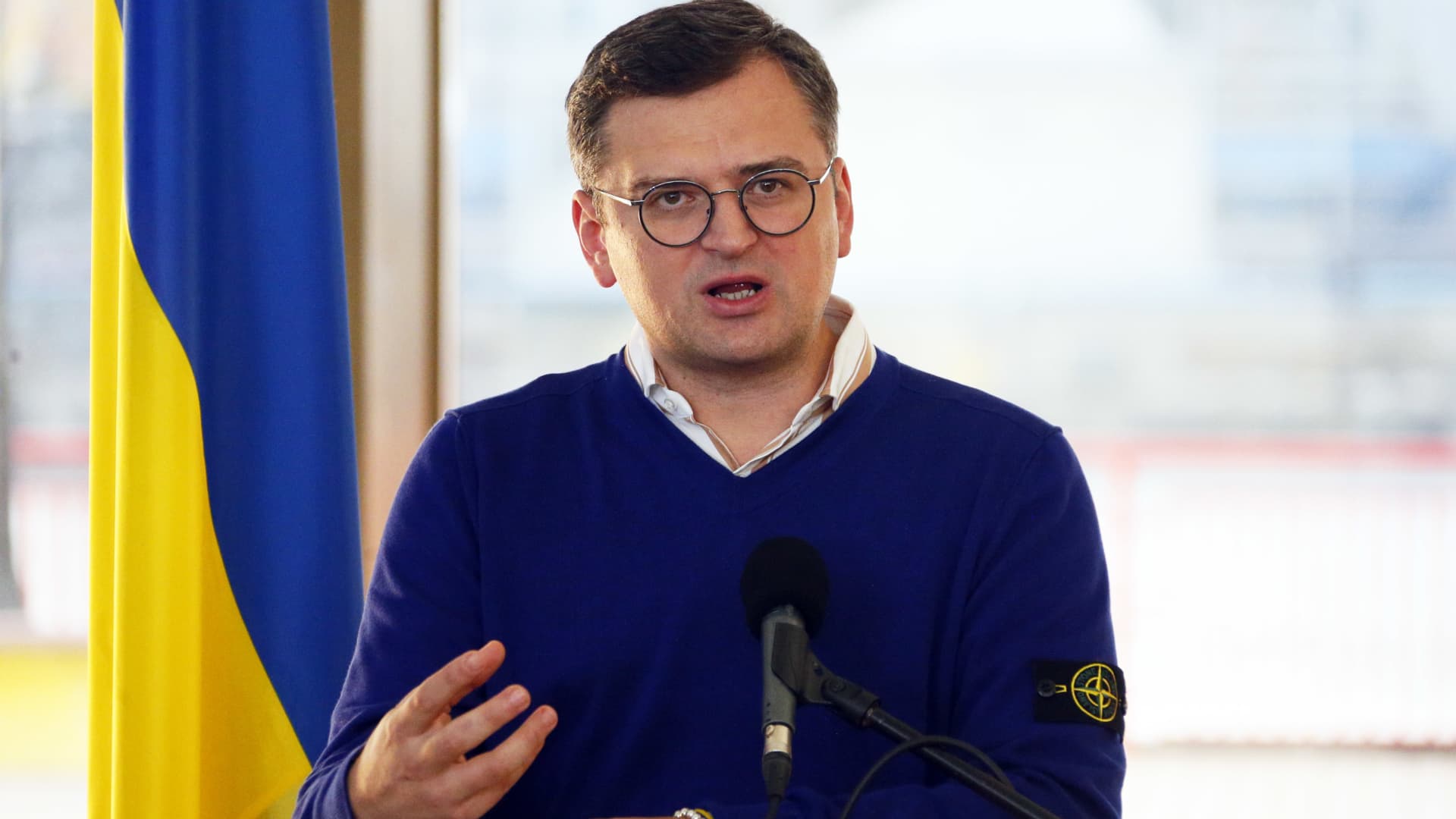
U.S. Ambassador to the United Nations Linda Thomas-Greenfield met with Ukrainian Foreign Minister Dmytro Kuleba on the sidelines of the high-level General Assembly in New York City.
The meeting between Thomas-Greenfield and Kuleba, their second since Russia's war broke out in late February, comes as the Kremlin attempts to hold referendums in Russian-controlled Ukrainian cities. The move is expected to set the groundwork for Russian troops to annex additional parts of the country.
The White House said the outcome of the votes in Luhansk, Kherson, Zaporizhzhia and Donetsk will likely be manipulated in Russia's favor and will therefore not be acknowledged.
"The Russians can do whatever they want. It will not change anything," Kuleba said alongside Thomas-Greenfield.
— Amanda Macias
Putin postpones surprise speech to Russians for unknown reasons
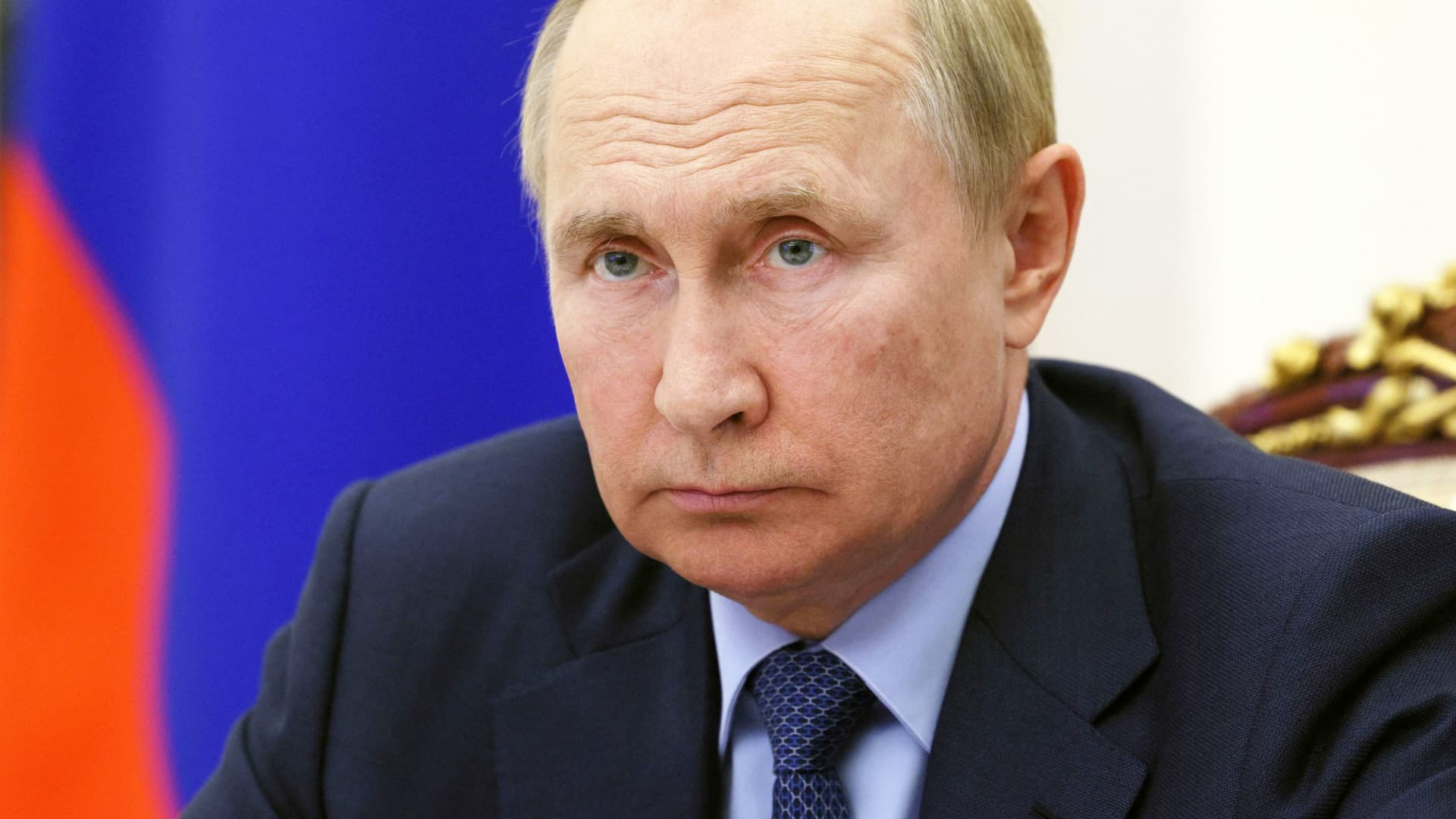
Russian President Vladimir Putin failed for unknown reasons to deliver a nationally televised speech that would have been his first since the invasion of Ukraine earlier this year.
Putin has postponed the speech, which was expected to discuss the situation in Ukraine, until Wednesday, according to a Telegram post by Sergei Markov, a former advisor to the Russian leader,
"Go to sleep," wrote Margarita Simonyan, the editor of RT, a Russian state media outlet, on her own Telegram account.
- Dan Mangan
Read CNBC's previous live coverage here:
Putin delays surprise speech; Germany's Scholz says Russia needs to understand it can't win


